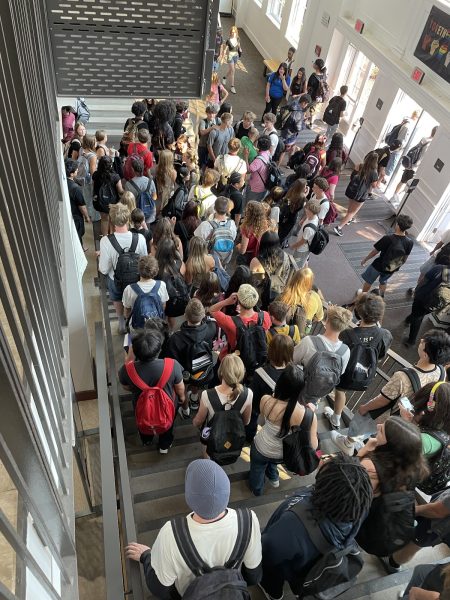
Earth 2024 — Water scarcity intensifies, top political leaders evade assassination attempts, and neighborly love turns to neighborly distrust. The youth of decades past sit aged and wizened in chairs eclipsing five times the value from their youth. The new young sit patiently, doe-eyed, questioning their future earlier than they should. The past is romanticized fantastically and the present is embittered woefully. No, this isn’t a science fiction novel, it’s America’s reality. Amidst an election many believe manages to support the hyperbolic “most important election in history” campaign strategies, Americans find themselves concerned for the future.
Prominent Americans such as former President Jimmy Carter have long held the belief that the youth are the future to prioritize. With the publishing of books like “Fight: How Gen Z is Channeling Their Fear and Passion to Save America,” as well as campaign rhetoric from presidential hopeful Kamala Harris about the importance of youth in politics, there is a clear correlation between older generations, like Generation X, finding hope in younger generations, such as Generation Z. When examining this turn to the youngest generation, a question may arise in response: What problems will Gen Z actually be able to solve?
Franklin civics teacher Portia Hall Rockne has been teaching for over 20 years, and she has noticed differences in generational motivation towards solving the issues of their time. She claims that “Gen Z feels the world is falling apart” and is “more connected than past generations due to smartphones.” She considers her generation, Gen X, to be less politically motivated than boomers or Gen Z, saying, “Gen X withdrew from society as a response [to neglect from boomers].” She points out how there has never been a Gen X president, and the generation has only recently begun to be more engaged with government. This is contrasted by the baby boomer generation’s relatively quick mobilization into government.
Hall’s thesis is that Gen Z, unlike Gen X, has the motivation and inspiration to solve their greatest crises. This sets them apart from other generations and gives Hall optimism for the future. However, Hall’s thesis’s self-acknowledged greatest drawback is Gen Z’s overreliance on phones and news-driven depression, stunting their creativity and problem solving.
With Hall’s words in mind, Franklin’s Senior Class Vice President Ailinh Van sheds light on how some Gen Z members think and if Hall’s thesis is corroborated by its subject. According to Van, the news is depressing, as Hall says; however, Van believes that “the news runs out of things to say” and carries little substance worth considering. Van also agrees with Hall that phones can be an inhibiting factor in Gen Z’s ability to solve future crises, going so far as to say she holds very little optimism for what she refers to as the “iPad kid generation” of her Generation Alpha cousins. Van elaborates that she worries for her cousins and the future they will one day inherit, acknowledging that, in her experience, older generations have looked upon her own Gen Z with the same sense of dread.
Returning to Hall’s optimism for Gen Z, Van concurs that she believes her generation has a lot in store for the future; however, she is unsure of her place in it. Most telling, Van explains that she is motivated when she hears about tragedies that emotionally resonate with her — such as school shootings or abortion rights — but she is relatively apathetic when confronted with issues she has no personal connection to.
As a result, Hall’s thesis becomes complicated. On the one hand, Van corroborates Hall’s optimism for Gen Z, on the other, Van shines a light on the importance of having an emotional connection to an issue to warrant activism to solve it. Perhaps Hall’s optimism is not mistaken when Gen Z is motivated, but it is entirely possible her optimism doesn’t account for the amount of apathy unaffected parties have for the crises of the future.
To get a better look at generational perceptions, Hall was asked to explain the issues of her generation and what she believes to be her generation’s greatest accomplishments. Hall argues that the greatest issues when she was a teenager were nuclear proliferation, AIDS, sexual harassment, and LGBTQ+ rights. Hall explains how these issues have been successfully mitigated. New treatments for AIDS have lessened its prior devastation, nuclear proliferation has ceased as a primary worry since the fall of the Soviet Union, LGBTQ+ rights have significantly increased, and the #MeToo movement has radically improved America’s landscape when it comes to sexual harassment.
Today, she considers climate change, gun violence, and abortion to be the greatest issues needing solving. Van agrees. The only issue of the three that Hall is less optimistic about is abortion, claiming it is the one issue from her youth that has continuously been a source of debate without any clear resolution.
With Hall’s comments on the successful mitigation of the greatest issues of her youth, she distinguishes who actually solved those issues. Contrasting her prior statements about Gen X’s lack of political power and political ambition, she notes that her generation has been significantly involved with popular culture and the production of art and storytelling, while the baby boomer generation was responsible for solving many problems and capitalizing on political involvement.
Much like Gen Z, the baby boomer generation grew up in a tumultuous time of draft protests, assassinations, counterculture, global crisis, and strong motivation to confront their greatest issues. Seeing the baby boomer’s aforementioned success, Hall’s belief Gen Z is the next in line for such change carries historical weight; perhaps Van is right to doubt the political ambition of the generation after her, for it is entirely possible they will favor cultural innovation instead.


































